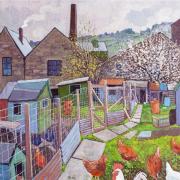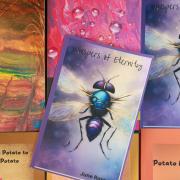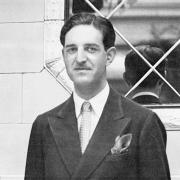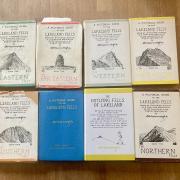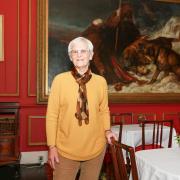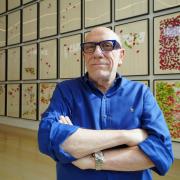Garstang farmer’s daughter Catherine Simpson has just published her first novel describing how one family tried to beat the milk crisis in an unusual way

I was born and raised on a Lancashire dairy farm and until I was five or six thought everyone had woods and barns and hay bales to play with. My parents were from big farming families, so my 30-odd cousins also lived on farms and my aunts and uncles were referred to by the name of their farm.
‘Are Sharples coming?’
‘Have Throstle Nest landed up?’
Our family was ‘New House’ because my parents, my two sisters and I lived at New House Farm, Winmarleigh, a 130-acre farm two miles north of Garstang.

My grandparents, David and Marjorie Simpson, originally moved there in 1925 as tenants. My parents, Stuart and Margaret Simpson, got the opportunity to buy the farm in 1974 from the then owner, Sir Basil Parkes, a fishing magnate with trawlers working out of Fleetwood.
Sir Basil arrived for tea one day - we gave him ham salad and blackcurrant pie – and asked out of the blue: ‘Would you be interested in buying the farm?’ To which my father replied: ‘If the price is right, I certainly would.’
The price was right, so my parents sold their herd of 80 pedigree Friesians to fund the purchase and then set about rebuilding the herd from scratch.
In the 1970s Winmarleigh had two shops and a travelling grocer, a pub, a church with its own vicar and a school with nearly 50 pupils. Today the shops and grocer are gone, the village shares its vicar with two other churches, and the school roll has halved, although the pub continues to thrive!

Back then the village was full of children and the year was interspersed with big family events including the Field Day, the Vicarage Garden Party (when the school children danced around the maypole), the WI Christmas Party and the Harvest Festival. At the Harvest Festival the village children arrived at church carrying Harvest baskets filled with home-grown potatoes, tomatoes and apples, plus the odd shop-bought bunch of bananas and tin of pineapple chunks. We would all belt out ‘We plough the fields and scatter the good seed on the land’ – a hymn that has subsequently been sung at the funeral of every farmer I’ve ever been to.
For farm children the highlight of the year was haymaking. My dad would ask: ‘What’s weather forecast saying?’ for days before mowing the grass. Then there’d be a nail-biting wait to see if rain would ruin some good hay. After the hay was bailed – into old-fashioned rectangular bales - came the fun part (for the kids) when the tractor and trailer were driven slowly round the field to collect the bails.
These were lifted by hand and pitchfork onto the trailer - exhausting work not really helped by us three girls clambering higher and higher on the swaying stack of bails. At ‘baggin time’ – around 4pm – we’d run home to collect a billy-can of strong sweet tea and a plate of home-made sponge cake to put us on until supper.
The hay had to be collected no matter what and the work continued through long summer evenings until we eventually sat down to a slap up meal cooked by my mother as it headed towards midnight.
Work on the farm was relentless with the cows needing milking morning and night, 365 days a year. Holidays were largely for other people. Instead, we’d go for a ride in the car when my dad would strain to look over the hedges to see if other farmers were mowing or bailing yet.
In those days it was rare (if not unheard of) for farmers’ wives to be employed off the farm. The women often worked outside feeding the calves and the hens, collecting the eggs or running milk rounds.
On our farm my father worked outside and my mother looked after the house, the children and the garden. My mother was the original domestic goddess; she could cook, bake, dress-make and knit. My sisters and I were dressed in home-made matching dresses (with home-made matching haircuts).
She grew our vegetables and fruit and boiled up great pans of jam. The kitchen table was always laden with home-made pies and cakes. I once opened a plastic bag to find a cow’s tongue waiting for my mother to cook and press it. I also remember watching my aunt get a lesson in plucking and dressing a chicken at the kitchen table
Unlike many farm children, my sisters and I were given few jobs. All we had to do was bottle a few pints of milk, straight from the tank, every evening and deliver it to a nearby cottage. We were also asked to ‘turn the cows’ – this meant standing in the lane waving a stick as 80 cows ran towards you and hoping they’d take the hint and go through the gate into the field.
Health and Safety was limited to being told ‘Ginny Green-teeth’ would drag you into any of the ponds if you got too close. I was ten when we got a pony and my sisters and I set off round the village with our new horse, two dogs, two bikes, one safety hat and no riding lessons between us.
Aged 19 I left the farm to join the civil service in Manchester and was shocked to discover that some people lived in houses where they could hear their neighbours stirring their tea.
My younger sister, Tricia, did a degree in Agriculture at Writtle College and came home to work on the farm. For economic and practical reasons the herd was sold in 2005. My mother died in 2006.
Tricia converted the milking parlour into a livery and my father continued to use the land for cattle in summer and sheep in winter. Ten years ago the magnificent old barns, in which we used to have the world’s best rope swing, were sold for development into luxury housing and have just been completed.
Tricia died suddenly last year, so my father, aged 89, is now running the livery and caring for the land on his own, 90 years after his own mother and father moved into New House Farm.
Although I’ve lived away from the farm for 30 years, the stories I write are usually set in Lancashire and full of Lancashire folk; it seems my roots go deep.
Herd the news
Catherine’s darkly comic novel ‘Truestory’ is set on a Lancashire dairy farm and it reflects the crisis many dairy farmers face as they struggle to survive on rock-bottom milk prices. However, one family finds a unique if illegal way of making ends meet.
Truestory, which is her debut novel, has just been published by Sandstone Press, priced £8.99.




